|
Pilgrims Way (Thurnham Road 1891 ) )
Thurnham
01622 737185
https://www.blackhorsekent.co.uk/
https://whatpub.com/black-horse
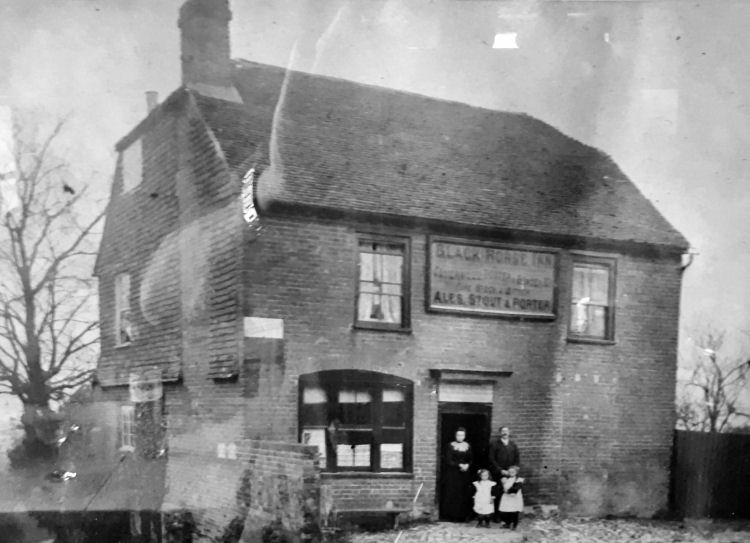
Above photo, date unknown, kindly sent by Ray Newman. |
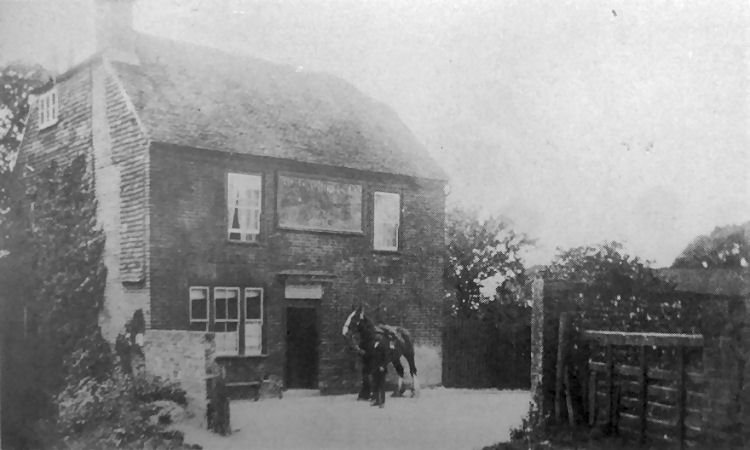
Above photo, circa 1897, kindly sent by Rory Kehoe. |
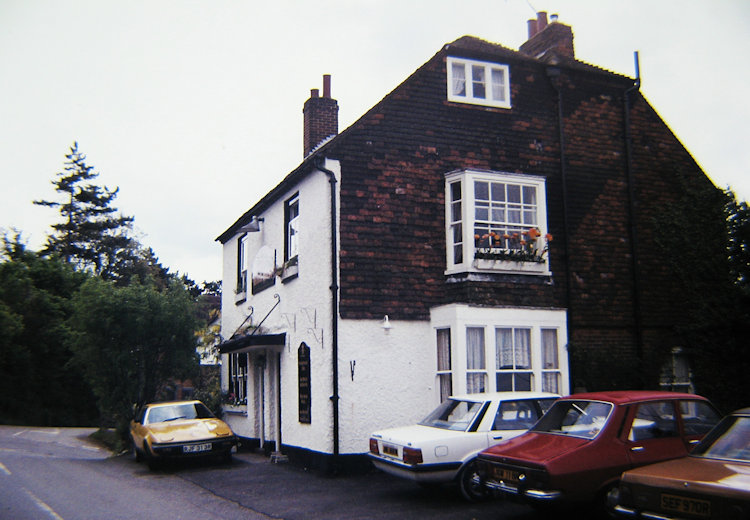
Above photo, 30 May 1983, by Jim Ashby. |
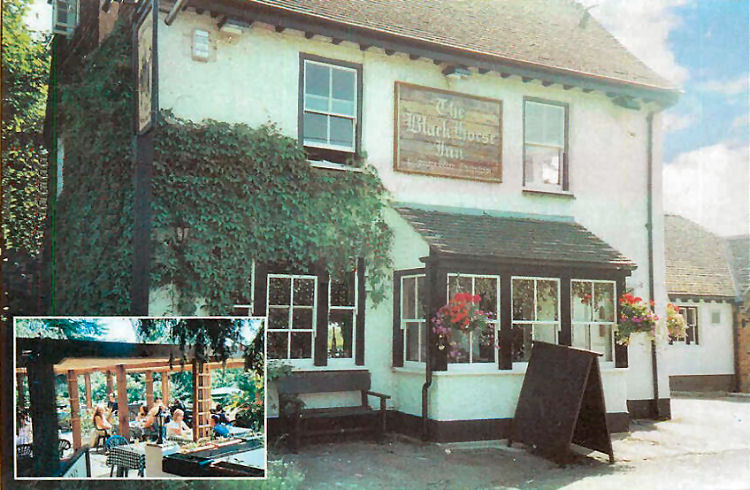
Above postcard circa 1999, kindly supplied by Rory Kehoe. |
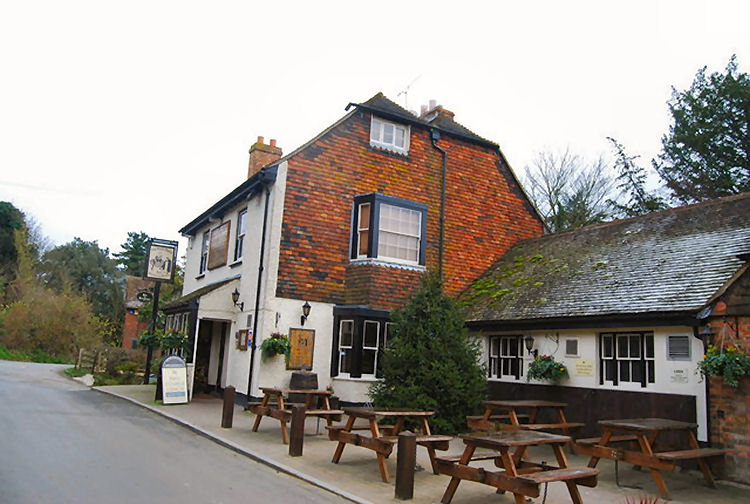
Above photo 2012 by N Chadwick
Creative Commons Licence. |

Above photo circa 2017. |
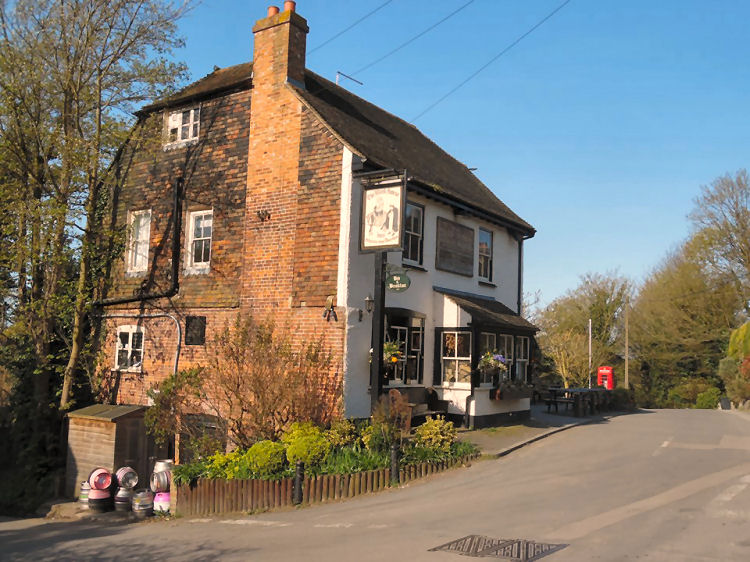
Above photo 2018 kindly taken by Karen & Barry Holt. |
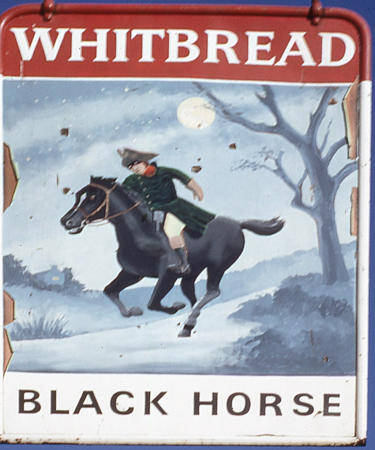
Above sign 1974.
With thanks from Roger Pester
www.innsignsociety.com. |
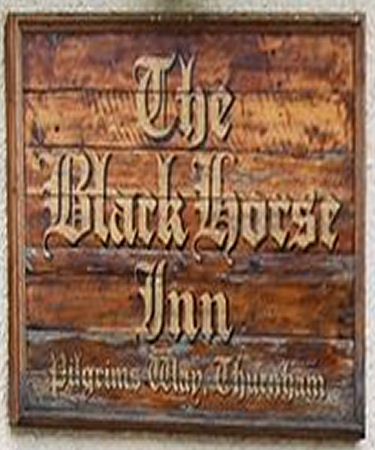 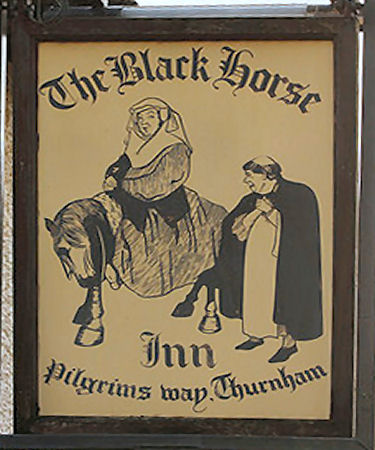
Above sign left 2014, sign right, 2015. |
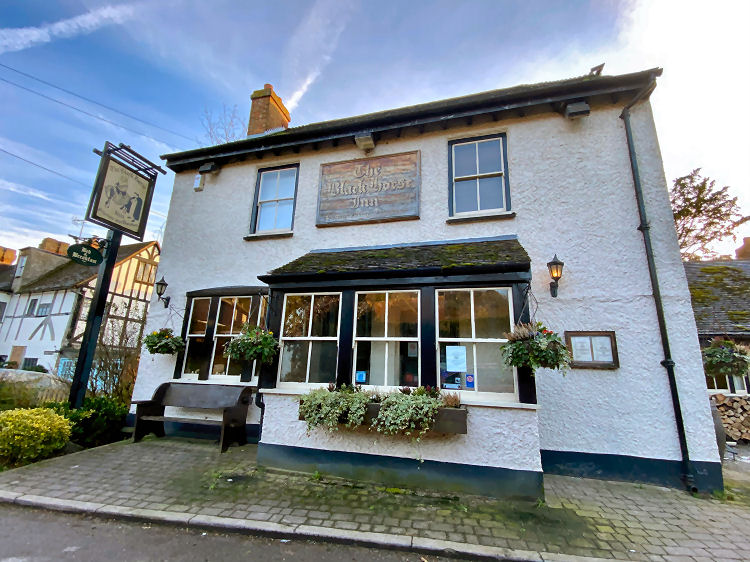
Above photo January 2021, kindly taken and sent by Jamie Goatman. |
I am informed that until 1861 this pub was a remote hostelry, without
road access. This changed, when Thurnham Lane was diverted from running to
the church and towards the pub.
|
Kentish Weekly Post or Canterbury Journal 13 May 1828.
MIRACULOUS ESCAPE.
On Saturday afternoon, a little girl named Lurcock, about three years
old, met with an accident which nearly proved fatal to her. She fell
into a dry well, near the "Black Horse," Thurnham, sixty five feet deep,
at the bottom of which (the well having laid open for some years) was
a great number of stones and large lumps of chalk. Two young men (sailors) promptly descended by means of a rope, and brought up the
child seriously hurt, but not dead, as had been fully anticipated. Mr.
Allen surgeon, of Hollingbourn, was immediately sent for, and he found
that the child had sustained a concussion of the brain, and some injury
in the body; but we are happy to learn that she is in a fair way of
recovery.
|
|
Kentish Chronicle, 24 November, 1829.
Attempting Highway Robbery and Murder.
Mr. Williams Bridgeland, of Roseacre, in the parish of Boarsied,
went on Saturday 1st November to
visit his aunt, Mrs. Mellor, living at the Pet Farm, in Stockbury;
and on his way home, through
Stochbury vallies, between 6 and 7 o'clock, about of a quarter of a
mile beyond Mr. Whitehead's
cottage, he saw a man in the middle of the road, to whom he said,
"Good night;" and instead of the
compliment being returned, he received a violent blow on his right
cheek. He return the blow, and
then saw the fellow was drawing a stout short stick from under his
arm; he immediately struck him to
the ground, when to his great surprise, a second villain sprung out
at the same moment from the
hedge, and with a dreadful oath, cried, "Murder him"! Mr. Bridgeland
them ran for his life till he
came to a lane near Bimbury Pound, when, finding the assassins were
fast gaining ground on in, he
threw himself over the hedge into a wood spring, and there laid
still.
They soon came up near the spot where he lay; but his clothes being
dark, they did not discover him.
He heard them after utter dreadful oaths, saying, "the -------- was
either down the lane or across the
field." The villains then separated, one went down the lane, and the
other across the field; after
which Mr. Bridgeland rose from his hiding place and made his escape
across the fields to the "Black
Horse" public house at Thurnham, nearly exhausted, but without any
other personal injury other than
his face and one hand being considerably hurt.
|
|
Maidstone Telegraph, Saturday 10 September 1870.
On the application of Obadiah Grove, landlord of the "Black Horse,"
Thurnham, for a
renewal of his licence. The chairman said one of the magistrates having
occasion to go to
the house in the case of a man being stabbed, it came out in evidence
that applicant had
allowed gambling to take place in his house, by playing skittles for
money.
Applicant said he was not aware that there was any gambling going on.
The Bench told him that he was responsible for all that took place in
his house.
The application was granted.
|
|
From the Dover Express, Friday 14 October 1870.
Maidstone. Committal for murder.
The coroner for Mid Kent, Mr. J. M. Dudley, held an inquest on Saturday
afternoon, at the Hollingbourne Union, near Maidstone, on the body of a
labourer, named Peter Smith, of Lenham, who expired on Thursday from a
severe stab in the abdomen. It appeared from the evidence of numerous
witnesses that Smith was in company of another man named James Sellen, a
labourer, of Stockbury, at the "Black Horse Inn," Thurnham, a village a
short distance from Maidstone, when an altercation ensued over skittles,
which was continued outside the house at the time of closing. Ultimately
they party, apparently good friends; but when Sellen had gone a few
yards he called out to Smiths, "Now I am in the high road, and if any of
you want anything, let him come out here." Smith immediately went up to
Sellen, when Smith fell back into the hedge, exclaiming, "I am stabbed."
Selling was at once secured, and surgical aid was immediately procured
for the wounded man. Upon the arrival of Dr. Sedgwick he had the
unfortunate man removed to the "Black Horse," where, upon examination,
he found he had sustained a severe wound of 2 1/2 inches in length in
the abdomen, and through which the intestines protruded, which were also
cut. He directly thrust back the intestines, and sewed the wound.
Subsequently Smith was removed to the Hollingbourne Union, where he
expired in great agony on Thursday last. A knife was produced (a common
pocket knife), which was found in a field, over the hedge, a few yards
from where the deceased was stabbed. When being taken to the police
station, the prisoner Sellen expressed a hope that the deceased would
not die, as he should be hung. A jury without hesitation returned a
verdict of "Wilful Murder." The coroner at once issued a warrant for the
committal of the prisoner for trial of the next Kent Assizes.
|
|
From the Bedfordshire Mercury, Saturday 15 October 1870.
Fatal Affray near Maidstone.
On Saturday afternoon last, Mr. J. N. Dudley (coroner for Mid Kent) held
an inquest at the Hollingbourne Union, on the body of a
labourer, named Peter Smith, who had been stabbed with a knife. It
appeared that Smith was in company with another man, named
James Sellen, at the "Black Horse," Thurnham, near Maidstone, when an
altercation took place over skittles, which was continued
till the close of the house, at 12 o'clock, when they parted. After
going a few yards, Sellen called out to Smith, who was with
several others, "Now I am on the High Road, if anybody wants anything
let him come out." Smith went up to Sellen, when the
latter immediately stabbed him in the abdomen, inflicting a wound two
inches and a half. The unfortunate man was conveyed to
the "Black Horse," where the services of Dr. Sedgwick were obtained, who
dressed the wound. Smith was subsequently removed
to the Hollingbourne Union, where he expired in great agony on Thursday,
the 6th inst. The knife was produced, a common
pocket knife, which prisoner had thrown over the hedge. As Sellen was
being taken to the station house, he prayed God the
deceased would not die, or he might be hanged. The jury, without
hesitation, returned a verdict of "wilful murder," against Sellen,
and the coroner thereupon issued his warrant for his committal for trial
at the next Kent Assizes.
|
|
Maidstone Journal and Kentish Advertiser, Monday 20 March 1871.
KENT SPRING ASSIZE.
The Business of the Assizes commenced on Tuesday morning, Mr. Justice
Hannen presiding in the Crown Court, where the following gentlemen was
sworn on the grand jury. Sir G. F. Hampton, Bart. (forman). Sir William
Young Yardley, Bart. R. Rodger. Esq. W. C. Moreland, Esq. C. Whitehead,
Esq. A. C. Ramsden, Esq. J. R. Ward. Esq. M. G. Best, Esq. H. G. W.
Sperling Esq. A. Beattie, Esq. J. L. Wildman-Lushington, Esq. J. Stone,
Esq. J. W. Stratford, Esq. J. J. Ellis, Esq. H. B. Walker, Esq. W. H.
Tylden Pattenson, Esq.
The proclamation of Her Majesty against vice and immorality having been
read, His Lordship proceeded to deliver the charge.
He had he said he was not sufficiently acquainted with the criminal
business of the County to say whether or not the number of cases in the
calendar exceeding the average, but he thought, looking at the extent of
the County, and its population, that it was scarcely up to average.
There was a case of Murder, to which he wished to direct the attention
of the Grand Jury. It was number 4 in the calendar, in which a prisoner
name Sellen was charged with a crime at Thurnham. It appeared to be a
case arising out of a quarrel which took place between the deceased man
and the prisoner, at a public house, where they were together. In the
first instance the deceased man was the provoker of the quarrel, but
afterwards the dispute was renewed, and the prisoner used a knife to
stab the deceased man in the body, and he died very shortly afterwards
of the wound. The only question which would arise was as to the
character of the act. That it was done by the prisoner there could be no
doubt on the evidence; but it would depend on the character of the
provocation giving whether it should be regarded as sufficiently recent
to reduce the crime to manslaughter. That was probably the matter of
which they would not enter upon, but would leave it to the jury who
would try the case.
|
|
London Evening Standard, Friday 17 March 1871.
SPRING ASSIZES. Home circuit.
Maidstone, March 16, before Mr. Justice Hannan.
Murder.
James Sullen, 31, labourer, was charged upon and indictment, and also by
the coroner's inquisition, with a wilful murder of Peter Smith.
Mr. Byron and the Hon. Mr. Stanhope conducted the prosecution. The
prisoner was defended by Mr. Ribton, and Mr. Walter Ballatine.
A good many witnesses were examined in support of the prosecution in
this case, but the facts lay in a small compass.
It appeared that on the night of the 4th of September the deceased and
several others labouring men were at the "Black Horse" public house, at
a village called Thurnham, near Hollingbourne, when the prisoner came
in, and they all remained in the taproom drinking together until about 9
o'clock, when they adjourned to the skittle ground, and the deceased and
one of the party played at skittles. During the play the prisoner
appeared to have chaffed the deceased in reference to his play, and the
latter, who was, no doubt, a good deal irritated at the remarks of the
prisoner, challenge him to play with him, and he refused to do so. The
parties remained for some time in the ground, the prisoner and the
deceased still continuing to wrangle and quarrel and eventually the
whole of the party returned to the taproom. The prisoner and the
deceased kept up their dispute and till 12 o'clock at night, when the
house was closed, and they all left. When they got outside, it appeared
that the deceased struck the prisoner a blow in the face, and challenged
him to fight; but he said he did not want to do so, and they shook
hands, and all the party proceeded homeward, the prisoner being about 30
yards ahead of the deceased and the others. When he had gone a short
distance it appeared that the prisoner was heard to call out "Here I am,
if anybody wants anything of me; here I am on the High Road." The
deceased seemed to have accepted this as a challenge to fight, and he
immediately went up to the place where the prisoner was standing, and
directly afterwards the deceased called out that he was stabbed. Upon
some of the other men going to the spot, they found the deceased lying
on the ground, and the prisoner standing close to him with the
deceased's jacket in his hand. Upon deceased being picked up, it was
discovered that he had received a desperate wound in the stomach, two
inches and a half in length, from which the bowels protruded. The
prisoner appeared to have, in the first instance, denied that he was the
man who had wounded the deceased, but he subsequently admitted that he
had done so, but not till the deceased and struck him, and he added that
he hoped the deceased would not die, as then he should only get 10 years
instead of being hanged. The deposition of the deceased was taken in the
presence of the prisoner immediately after the occurrence, and it was to
the effect above stated, with the addition that the moment he came up to
the prisoner and was in the act of taking off his jacket to fight him
with the prisoner stabbed him, and in answer to a question put by the
prisoner, as to whether he had not first knocked him down he positively
denied having done so. A penknife, which was identified as having belong
to the prisoner, and with which there was no doubt the desperate act has
been committed, was picked up close to the spot where the final
occurrence took place. The evidence established that both prisoner and
deceased were the worst all liquor at the time.
Mr. Ribton made an able address to the jury on behalf of the prisoner,
and, while admitting that it was impossible to dispute the fact that the
deceased met his death at the hand of the prisoner, he contended that
under the circumstances the offence did not amount to the serious crime
of wilful murder, particularly having regard to the provocation the
prisoner had received from the deceased.
Mr. Justice Hannan summed up the case very carefully, observing that
there was this point undoubtedly in favour of the prisoner, that he had
not gone in search of the weapon, but had it in his possession at the
time the deceased went up to him, and he then pointed out to the jury
that distinction in the eyes of the law between the offences of
manslaughter and murder.
The Jury after a very short deliberation found the prisoner guilty of
manslaughter, and he was sentenced to be kept in penal servitude for 15
years.
|
|
Maidstone Journal and Kentish Advertiser 09 March 1899.
BEARSTED POLICE COURT.
ALLEGATIONS AGAINST A PUBLICAN.
Ernest Wade, landlord of the "Black Horse Inn," Thurnham, summoned for being
drunk and disorderly, at Bearsted, on the 23rd Feb.
Mr. A. J. Ellis
appeared for the defence.
Corpl. Fowler deposed to seeing the defendant
about 9.55 on the evening of the date named, near the "White Horse Inn,"
drunk and using very obscene language. He was molesting another man, who
had same difficulty in getting away from his company. After much
persuasion the defendant went towards his home. He had been ejected from
the "White Horse."
P.C. Hughes said he saw the defendant enter his house
drunk. Addressing the Bench, Mr Ellis commented on the absence of
independent corroborative evidence. He called the defendant, who said on
the date named as he was returning home from Maidstone he called at the
"White Horse," Bearsted, from which house he denied the allegation that he
had been ejected. Outside the house he met a man with whom he conversed
about private affairs. The conversation became rather heated, but he
denied using bad language.
Frank Telford manager of the "Black Horse,"
said when the defendant arrived home he was perfectly sober.
The Bench
after a short consultation, decided to dismiss the case, although they
had grave doubts as to the defendant's condition. They considered that
the evidence had not been sufficiently placed before them by the police.
|
|
From the
https://www.kentonline.co.uk By Secret Drinker, 17 May 2019.
Secret Drinker reviews the Black Horse pub at Thurnham, near Bearsted.
What a place to start my quest as a secret drinker – is this the
quintessential British pub to beat all others? If not, I’d like to know
what is.
I came across The Black Horse Inn purely by chance, but I’ll definitely
be back to sample its delights again. And, I’ll drag all my American
cousins and Aussie mates along as there can’t be a better example of a
proper British boozer.
Add that to the fact it sits firmly and squarely on the Pilgrims Way and
you’ve got a history and English lesson all wrapped up in one.
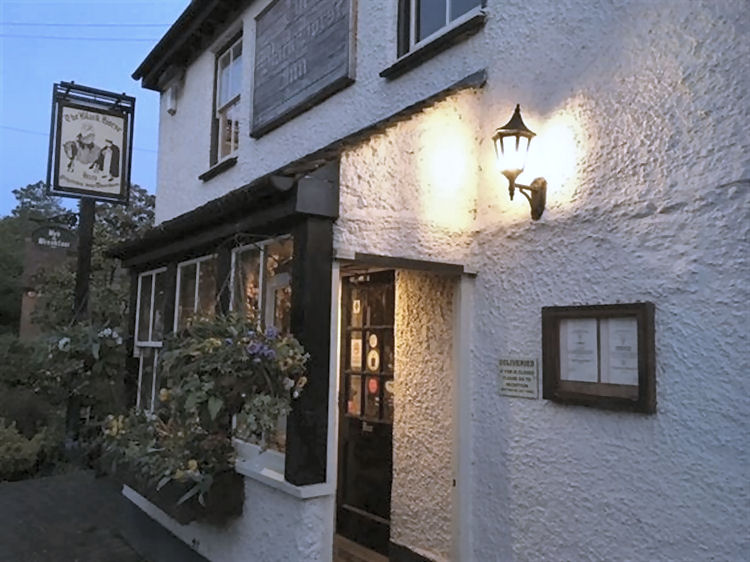
Relaxed and unpretentious, the Black Horse sits in the shadows of the
North Downs.
In keeping with tradition I started my visit with a classic pint of Red
Top from the Old Dairy Brewery at Tenterden. At 3.8% it’s not over
powerful, but tastes stronger than the number suggests. A good earthy
aroma and a deep fruity taste with more than a hint of chocolate.
The place is plastered with dried hops and there are logs stuffed into
every nook and cranny, including the entrance porch - the open fires
must be great on a winter’s evening.
There are even stools fashioned from old fashioned milk churns and a
candle in a Tattinger bottle on every table.
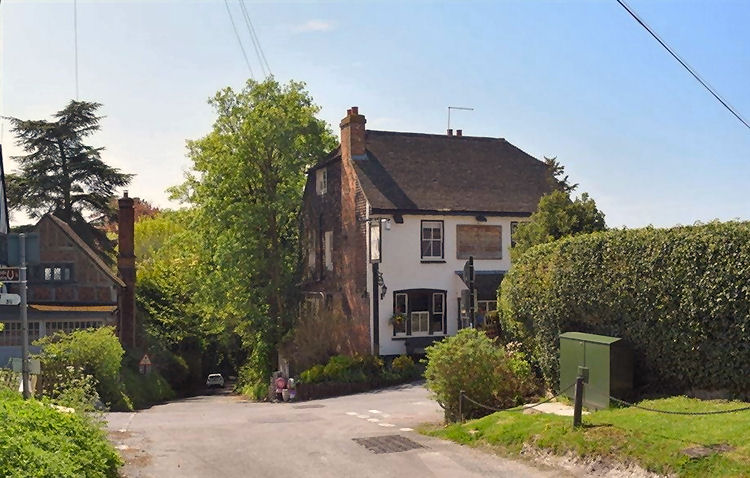
If you're coming by train, the pub is a bit of a hike from Bearsted but
well worth the effort.
With a packed restaurant and a notice on the wall reading ‘Our Kitchen –
God gave us the ingredients, the Devil gave us the chefs’ it would have
been rude not to try the food.
Chilli, ginger and garlic prawns followed by a smoked burger with all
the trimmings and a dark chocolate and peanut butter tart. All excellent
and served with a wide smile. Don’t drop the menu on your toe though,
with a wooden cover it’s a hefty beast.
Special mention must go to the incredibly flamboyant local fellow who
spent the whole evening gently insulting all the bar staff before
gathering up his long, flowing pink scarf and, with his bracelets and
necklaces clanking noisily headed into the night.
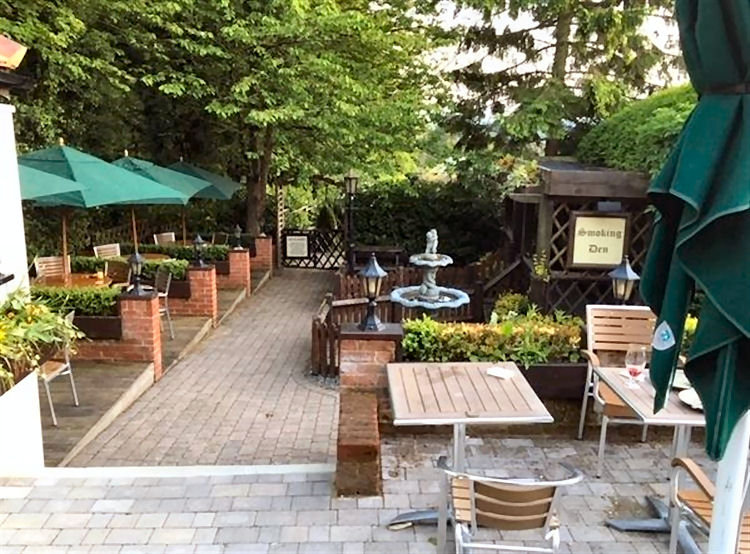
There's also a decent sized garden and seating area.
He was only upstaged by his companion – a massive ball of white fluff
sporting a bright red light-up collar, I think it was a Samoyed by the
name of Potts. Either way, dogs are definitely welcomed in the bar.
The gents was fresh and clean with the smallest sinks possible, but you
do get great smelling hand cream.
If you want to stay overnight, single rooms start at £75, doubles from
£95 plus another tenner for your faithful hound. This must be the
perfect place to end a decent dog walk.
No need to say more, you’ll find all the history you could possibly want
on the incredibly detailed website
www.blackhorsekent.co.uk
|
LICENSEE LIST
COBB John 1828+

JOY William 1832+

ASHFIELD John 1840+
DUNK John 1841-58+ (age 71 in 1851 ) )
GROVE Obadiah 1861-71 (age 46 in 1861 ) )
GROVE Edith 1871+ (age 56 in 1871 ) )
MERCER Thomas 1881+ (age 60 in 1881 ) )
LOVE William 1891+ (only beehive maker age 37 in 1891 ) )
MASTERS Richard 1891+ (age 67 in 1891 ) )
WADE Ernest 1899+
ROBINSON Charles H 1903+

BODIAM Walter William 1911-13+ (age 38 in 1911 ) )
JURY Horace Henry 1918-22+
HUNT Robert 1930-38+
https://pubwiki.co.uk/BlackHorse.shtml
 From the Pigot's Directory 1828-29 From the Pigot's Directory 1828-29
 From the Pigot's Directory 1832-33-34 From the Pigot's Directory 1832-33-34
 Census Census
 From the Kelly's Directory 1903 From the Kelly's Directory 1903
|













